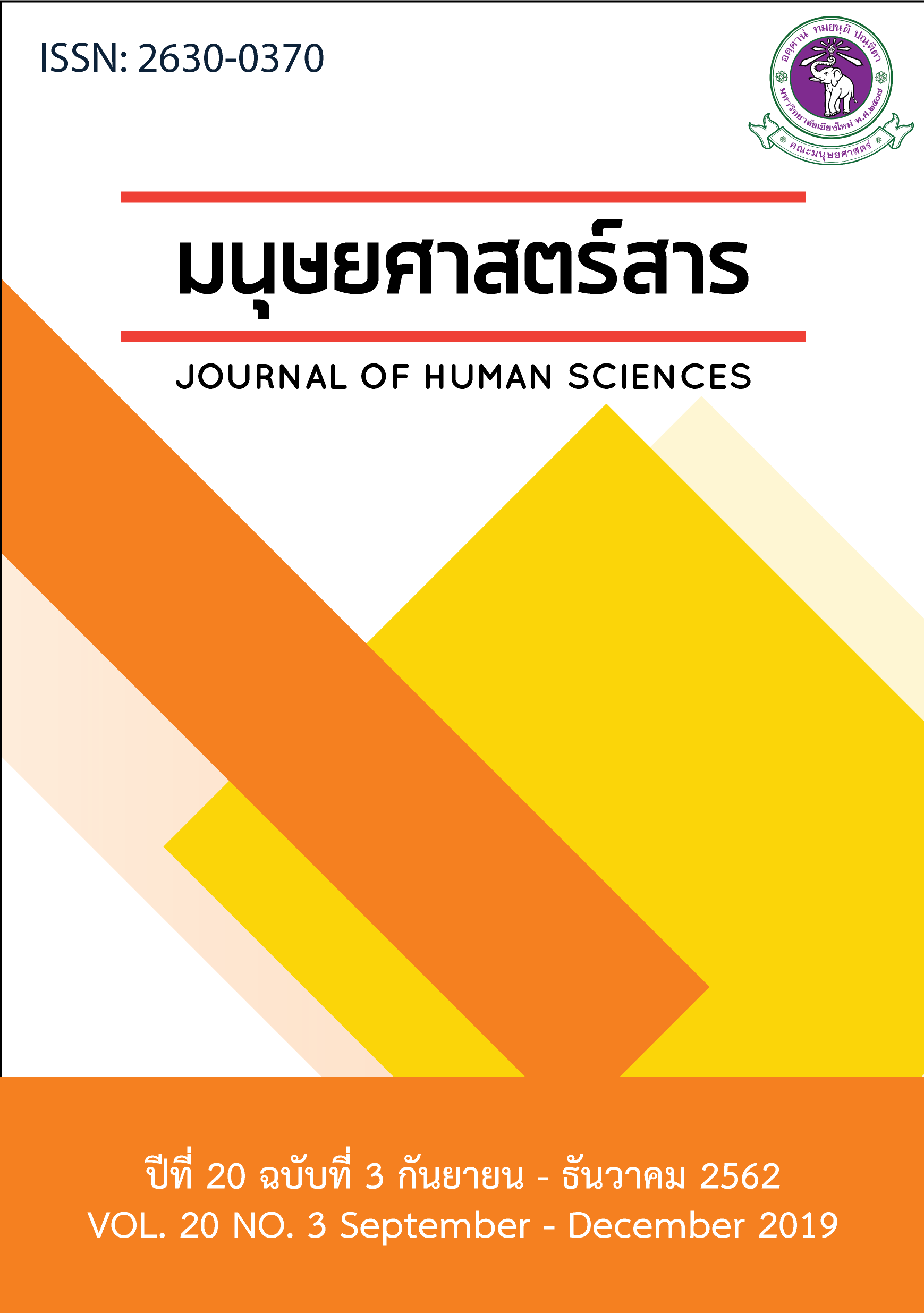“แผนภูมิสวรรค์” (天干地支) กับการถ่ายทอดอุดมการณ์ผ่านคำทำนาย
Main Article Content
บทคัดย่อ
โหราศาสตร์เป็นสิ่งที่อยู่คู่กับสังคมชาวตะวันออกมาอย่างยาวนาน คำทำนายทางโหราศาสตร์มีอิทธิพลต่อความเชื่อของคนหลายคนอย่างฝังรากลึก ซึ่งส่งผลต่ออารมณ์ความรู้สึกและการดำรงชีวิตของบุคคลเหล่านั้นได้ บทความนี้มีวัตถุประสงค์ในการศึกษาอุดมการณ์ที่ถ่ายทอดจากคำทำนายในแผนภูมิสวรรค์ (天干地支) อันเป็นศาสตร์ การพยากรณ์เก่าแก่ที่สืบทอดมาอย่างยาวนานของจีน เพื่อแสดงให้เห็นถึงประเด็นสำคัญที่ว่า ในคำทำนายเหล่านั้นมีอุดมการณ์ซ่อนอยู่นอกเหนือไปจากคำทำนายธรรมดาที่เราพบเห็น ทั้งนี้ ในแผนภูมิสวรรค์ (天干地支) ได้ถ่ายทอดอุดมการณ์สำคัญคือ “อุดมการณ์คำสอน” อันเป็นหลักสำคัญที่ใช้ในการดำเนินชีวิตและการประกอบกิจการงาน และ “อุดมการณ์ค่านิยมแห่งคุณลักษณะของบุคคล” ซึ่งเป็นค่านิยมอันพึงประสงค์ที่บุคคลและสังคมยอมรับ ซึ่งชี้ให้เห็นว่า การใช้วิจารณญาณในการเชื่อคำทำนายทางโหราศาสตร์นั้นไม่ใช่สิ่งที่งมงาย หากแต่นำมาซึ่งประโยชน์ทั้งต่อตนเองและผู้อื่น
Article Details
เอกสารอ้างอิง
Amornvitkijvecha, T. (2017). Kan nam sanœ phra phut satsana khong sangkhom Thai nai yuk dichithan phan sư nangsưphim
[The Presentation of Buddhism in Thailand in the Digital Age Through Newspapers Content Analysis] (Master of Communication Arts thesis, Bangkok University).
Bian weihui 编委会. (2015). Zhouyi Xiangjie: Chuanshi Jingdian [Detailed explanation of Zhou Yi: Handed down classic]. China Nanjing: Jiangsu fenghuang meishu.
Chueathong, R. & Rodjanapraphayon, R. (2016). Khaniyom Udomkan lae Rubbaebkansuesan thi sadaeng tueng laksana thang wadthanatham khong konthai [Values, Ideologies, and Communication Patterns Indicated Thais’ Culture]. NIDA Journal of Language and Communication, 21(29). 110-143.
Confucius Institute. (2016). Shengxiao Wenhua qutan [Interesting talk in Zodiac culture]. Retrieved from http://www.cim.chinesecio.com/hbcms/f/article/info?id=057016614a8f45a7bb581e6b4c925526
Heywood, A. (2012). Political ideologies. (5th ed.). Hampshire: Palgrave Macmillan.
Kang De, L. (2014). Tian gan di zhi Zhongheng tan (shang) [Talk in Sexagenary cycle (1)]. Xinmin Evening News. p. 7.
Khomin, S., Samakkan, S. & Janthavanid, S. (1936). Naewkid kiaokab wadthanatham khaniyon lae bokkhalikkaphab [Concept of Culture, values and personality]. Sociocultural basis of Thai politics. Sukhothai Thammathirat Open University. Bangkok: Khunpinaksonkit.
Kongseng, K. (2016). “Rangkai phaitai bongkan” kanplianplaeng khwammai “Khwan-ngam” khong satri thai-jin tam viti samaimai [Under-control Body Vessel”, the Change of Meaning on “Beauty”of Thai-Chinese Woman in Modern Age]. Lampang Rajabhat University Journal, 5(2). 235-249.
Kongseng, K. (2018). “Phi” nai samnuan jin: Lokkathad khong chaojin to Manud lae Thammachad [Chinese idioms which consist of the word “Gui (鬼 “ghost”): The worldviews of Chinese people which a towards human and nature]. Mangrai Saan, Journal of Humanities and Social Sciences, 6(2), 1-20.
Nakbutr, T. (2013). khwamsamphan rawang khwam chưa dan horasat kap khwam suk naithi tham ngan khong phanakngan bo mo cho. thanakhan krung Thai samnakngan yai sai ngan patibatkan [Relationship between astrology belief and happiness Workplace of Operation Group Staffs in Krung Thai Bank Public Company Limited for head office] (Master of arts thesis, Silpakorn University).
Office of the Royal Society. (2010), Horasad [Astrology], (online). Retrieved from http://www.royin.go.th/?page_id=130
Pat 7.4. (2016). Phasajin [Chinese]. Retrieved from https://www.facebook.com/pat7.4cn/posts/619829291527081
Pilanthaowad, O. (2004). Wadwipak tawantok (koso 1952 thueng padjuban) kab paribod Phrathedthai [Rhetorical Criticism]. Bangkok: Chulalongkorn University.
Pinkaew, R. (2011). Modu onlai: Kansuesan kwamchuea horasad phan sueintened [Online astrology: communication and astrological belief on the internet] (Master of Arts thesis, Thammasat University).
Promote and coordinate the dissemination of the ideology of Pandintam Pandinthong project Center. (1936). Udomkan phaendintham phaendinthong: Nayoubai lae kan patibad [The Ideology of Pandintam Pandinthong: Policies and practices]. Bangkok: Victory Powerpoint.
Puapattanakun, C. (2013). Khwamsamphan rawang Phasa kab Udomkan nai wathakam kanphayakhon [The Relationship between language and ideologies in the discourse of fortune telling : A Critical discourse analysis] (Doctor of Philosophy thesis, Chulalongorn University).
Rokeach, M. (1973). The nature of human values. New York: The Free Press.
Sawasdee, B. (2018). Tualaek likhid chiwid rao dai rue : Udomkan chata niyom kab kan roiriang thalaek [The numbers can control our destiny?: Fatalism in number arrangement]. Veridian E-Journal. Silpakorn University, 11(2). 982-1001.
Sexagenary cycle. (2019). Retrieved from https://simple.wikipedia.org/wiki/Sexagenary_cycle
Superrich Thailand. (2019). 2019 Rili: Chaibao [Treasure, 2019 Calendar]. N.P.: SuperRich Currency Exchange (1965).
Suriyaarak, S. (1969). Horasad Thai [Thai Astrology], Bangkok : Kasem bannakid.
Thabthiwmai, Y. (1994). “Patimok sangwon”: Lakkan khong chaophud [Patimok Sangworn: Buddhist principles]. Matichon Weekly.
Yianju jixiang wang. (2016). Bazi: Bazi Suanming [Eight characters: eight characters fortune telling]. Retrieved from https://m.zhouyi.cc/bazi/sm/


